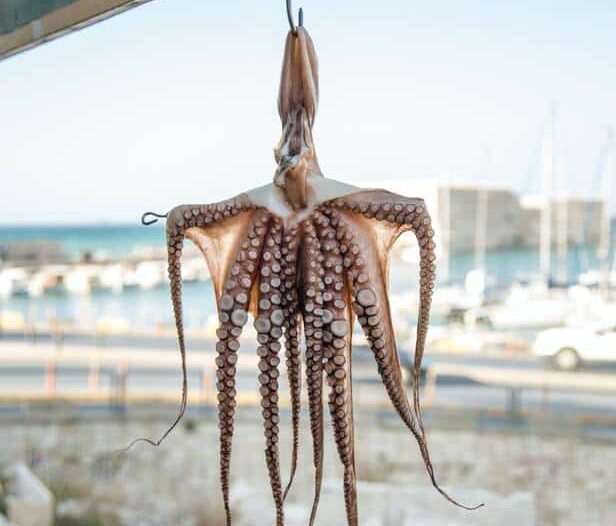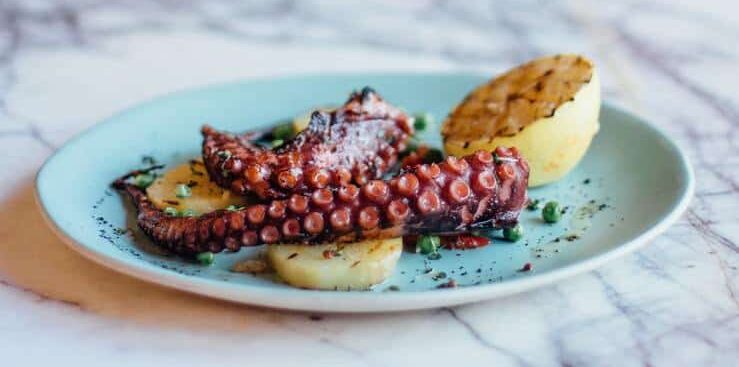In many parts of the world, consuming whole octopus, raw and very much alive, is considered a delicacy. If you eat meat – never mind a live octopus – you will probably wonder if eating this live animal is cruel and if they can feel pain in the process.
Eating live octopuses is considered cruel by most standards as they have highly complex nervous systems composed of 500 million neurons located in their brain. This means that they have keen decision-making skills, the ability to understand the concept of suffering, and the potential to feel pain.
Animal advocates like PETA have fought for years to have restaurant owners remove live octopus from their menus. And yet, some diners still seek out the controversial dish. Read on to delve deeper and explore the octopus's point of view.
The Cruelty in Eating Live Octopus
While many people may question the idea of non-vertebrate animals displaying any form of intelligence, that argument goes straight out the window when we take a look at the octopus.
The IQ of an octopus is on par with that of a dolphin. They have been known to perform amazing feats under the sea as well as on land.
There is plenty of evidence to back up the intelligence of an octopus. It is often said that they have nine brains instead of one, and they have millions of neurons that exist independently, allowing them the high-level ability to:
As a sentient being, I couldn't imagine being eaten alive while being completely aware of the entire ordeal. Knowing this information makes it unlikely that the octopus would not feel the pain of being eaten. But what do the experts say?
Octopuses Are Intelligent – And Have Heightened Senses
Octopuses are known for their keen intelligence, excellent spatial memory, and ability to learn new information. There are many instances of octopus engaging in high-level activities such as:
Not only are they extremely intelligent. Their advanced brains and dense cluster of neurons make them especially sensitive, too.
The neurons in octopuses' arms turn their limbs into heightened sensory organs allowing for an alleviated sense of touch, smell, and taste.
These heightened senses can continue to react an hour after it has been severed, at times even attempting to pick up food to feed a body that it is no longer connected.
Do Octopus Feel Pain When Being Eaten Alive?
Remember earlier when we talked about the octopus's arms having the capability to work independently of one another?
Well, this means that each arm also has individual decision-making abilities, which triggers the octopus’s instinctive reaction of squirming and wiggling once it has received extensive trauma, such as being severed from the body.
If you've seen the videos of restaurant patrons devouring live octopus on YouTube, then you have seen firsthand an octopus's reaction to painful stimuli. This shows that it is highly likely that the octopus feels and can also remember the origin of and understand the concept of pain
Is It Any Less Cruel to Kill an Octopus and Then Eat It?
Some may argue that it is never acceptable to eat such an intelligent and remarkable creature, even if it is humanely killed and sold as food to be cooked or eaten raw. Is the hunting, capturing, and killing of an octopus something that causes them trauma?
Octopus "can anticipate a painful, difficult, stressful situation—they can remember it."
These are the words of cephalopod expert Dr. Jennifer Mather. She has published numerous studies on octopus and other types of cephalopods sentience and pain.
It can be argued that the moments between capture and killing are cruel for such a sentient creature. And killing methods can include clubbing and slicing open the brain, which many would consider cruel enough.
However, these methods don't differ significantly from the treatment of many underwater animals harvested for food.
It is the dismantling and consuming of an octopus while it is alive, though, that is a different story in and of itself.
The Cruelest of Octopus Dishes
So far, we have learned about the millions of neurons that are part of the octopus's central nervous system that enables them to not only feel pain but allows their brain to be keenly aware of a loss of a limb.
Sannakji, a popular South Korean and Japanese dish that translates to "live octopus," is a raw dish that can be consumed by eating the chopped raw wiggling pieces of octopus limbs with sesame oil. When preparing the dish, the octopuses are often kept alive even after some of their limbs have been severed.
The chef then kills the octopuses by cutting open their heads and pulling out their intestinal tract. The dish can also be consumed by wrapping the live octopus around chopsticks and eating it whole, starting from the head.
It is hard not to call this dish cruel if you have any compassion for this living creature. And it's not without its risks for the diner, either.
Is It Dangerous to Eat Live Octopus?
Approximately six people die each year from eating sannakji, and it is considered one of the world's most dangerous dishes. Most restaurants that serve this popular Asian dish have signs posted explaining the potential health risks of eating live octopuses.
This includes choking to death and the possibility of being infected by a flesh-eating bacterium from eating raw fish and other sea creatures.
Live Octopus is a Choking Hazard
Although detached from the octopus's body, the thousands of suction cups on the arms continues to maintain their gripping power even as it clings to the insides of the mouth, tongue, and throat as it is swallowed, creating a choking hazard for the person hoping to enjoy a little snack!
With those millions of neurons (yes, those again!) still firing even after being severed, those arms are doing everything they can to avoid being digested, including crawling out of the mouth of the person consuming it!
Suppose you have seen the graphic videos of hungry restaurant patrons on YouTube. In that case, you will notice that many people are willing to take that risk without, I'm sure, taking time to reflect on the octopus's journey to the plate to be consumed alive.
Live Octopus Can Transmit Flesh-Eating Bacteria
Eating octopus live can also lead to Necrotizing fasciitis, aka flesh-eating bacteria, a rare and serious infection of the skin and tissues that rapidly destroys muscle, skin, and fat tissue. It can be deadly if not treated right away.
The symptoms can start with itchy skin, which can transform into large bloody blisters, lesions, and blood clots all over the hands, feet, and body, leading to infected limbs or digits falling off as the bacteria attacks the immune system.
Many victims of this disease have had to undergo months of extensive surgery and possible amputation.
How Cruel is it to Eat Live Octopus?
While some of us may not feel the same attachment to an octopus as we do a cuddly family pet or a big-eyed farm animal, these are beautiful creatures who contribute greatly to their eco-system.
The octopus is considered one of the most intelligent life forms under the sea and on this planet. With intelligence comes deeper levels of sentience of not just their world but also the world around them.
When an imbalance, such as pain, is introduced, not only are they keenly aware, but their bodies continue processing that pain even after being dismembered.
Considering this, it is hard not to consider the practice of eating live octopus to be an especially cruel one.


